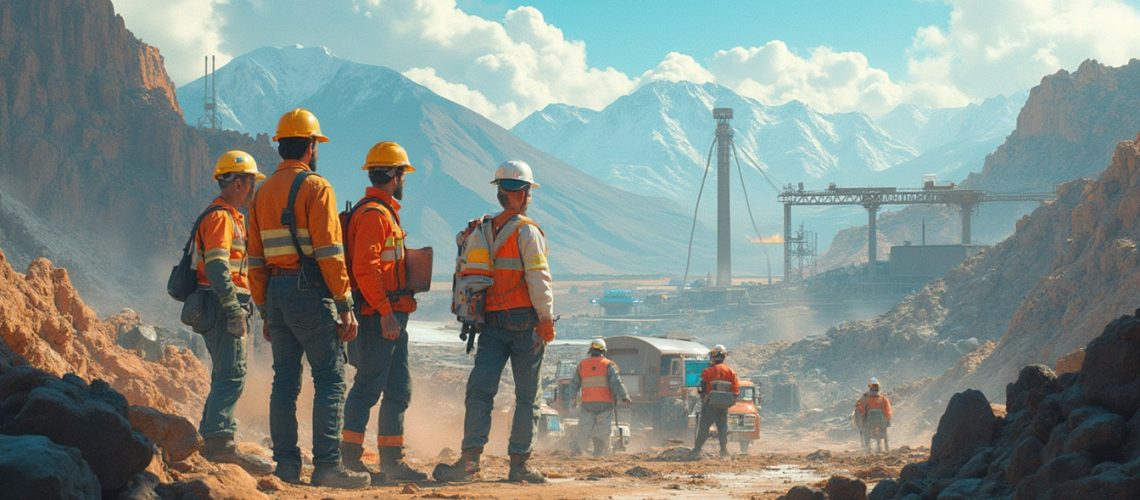Mining Industry's Critical Need: Investing in Human Capital and Strategic Projects
The mining industry represents a substantial global economic force, valued at approximately $1.5 trillion annually. This sector employs millions of workers worldwide, with significant operations concentrated in remote and developing regions.
Gareth Penny's seminal statement, "Capacity building is as integral to mining operations as investment is," encapsulates a fundamental truth about modern resource extraction. His insights highlight the critical interdependence between human expertise and technological advancement in the mining sector.
Why Are Human Capital Investments Crucial in Mining?
Investing in human resources is not merely a corporate responsibility but a strategic imperative for sustainable mining operations. The World Bank estimates that every dollar invested in education generates up to $10 in economic growth, underscoring the potential returns of strategic workforce development.
Training programs within the mining sector have demonstrated remarkable outcomes, including significant reductions in workplace accidents and injuries. These initiatives save millions of dollars annually while simultaneously enhancing operational efficiency and worker safety.
Technical education and continuous skill development ensure that mining professionals remain adaptable in an increasingly complex technological landscape. By prioritising education and training, companies can build resilient workforces capable of navigating sophisticated digital transformation challenges in mining.
What Challenges Confront the Modern Mining Industry?
The contemporary mining sector faces multifaceted challenges that extend beyond traditional resource extraction. Global demand for critical minerals is projected to increase by 20% by 2025, driven primarily by the clean energy transition and emerging technological requirements.
Resource scarcity and environmental sustainability have become paramount concerns. Mining companies must balance economic imperatives with responsible environmental stewardship, a complex negotiation that requires sophisticated strategic planning and innovative technological solutions.
Regulatory environments play a crucial role in determining industry success. The 2023 World Risk Report highlights how countries like Saudi Arabia have positioned themselves as emerging leaders through progressive mining investment frameworks.
Regulatory Stability: The Foundation of Mining Investment
Regulatory consistency provides the essential framework for attracting sustained investment in mining projects. Long-term, predictable policy environments signal to investors that their capital is secure and potential returns are achievable.
Saudi Arabia's 2020 Mining Investment Law serves as an exemplary model of progressive regulatory design. By creating transparent, investor-friendly frameworks, nations can transform their mineral resources into significant economic opportunities.
Stability in regulatory approaches can increase investor confidence by 10-15%, a substantial margin in an inherently complex and capital-intensive industry.
Financial and Human Capital: Pillars of Mining Resilience
Asset management firms like Ninety-One play pivotal roles in financing large-scale mining projects, with average investments approaching $500 million per individual project. These financial mechanisms are complemented by strategic human capital investments.
The mining sector requires a diverse range of skilled professionals, including geologists, engineers, and technicians. The average annual salary for a mining engineer in the United States, approximately $90,000, reflects the specialised expertise demanded by the industry.
Capacity-building programs and technical education initiatives are essential for developing the sophisticated workforce required to navigate increasingly complex geological landscapes of ore deposits.
Technological Transformation in Mining Operations
Cutting-edge technologies have revolutionised extraction and environmental management processes. Recent innovations have reduced operational waste by up to 30% while simultaneously improving overall competitiveness.
Experts like Robert Friedland advocate for integrating renewable energy sources into mining practices, recognising that technological advancement is not just about efficiency but also about environmental responsibility.
These technological interventions create long-term operational efficiencies that extend beyond immediate financial considerations, positioning forward-thinking companies for sustained success.
Sustainability: A Strategic Imperative
Embedding circularity into mining operations has demonstrated significant potential for cost savings and enhanced community relations. The World Economic Forum reports that companies adopting circular economy practices can reduce waste by up to 50%.
Sustainability is no longer a peripheral consideration but a core strategic requirement. By focusing on local sourcing, waste reduction, and energy efficiency, mining companies can secure their social license to operate.
This holistic approach ensures that mining operations contribute positively to local economies while minimising environmental impact.
Conclusion: Shaping the Future of Mining
The mining industry's future depends on a delicate balance between technological innovation, human capital development, and sustainable practices. By investing strategically in people, technology, and responsible operations, the sector can chart a path towards continued global economic significance.
The insights from industry leaders like Gareth Penny underscore a fundamental truth: success in mining is not about extracting resources, but about cultivating a comprehensive, forward-thinking approach that values human expertise as much as geological potential.
Ready to Uncover the Next Big Mineral Discovery?
Unlock the potential of your investment strategy with Discovery Alert’s real-time notifications on significant ASX discoveries. Our AI-powered alerts make it easy to spot trading opportunities and promising long-term investments. Whether you’re new to the field or an experienced trader, you can benefit from our service. Experience it firsthand with a 30-day free trial at Discovery Alert.







